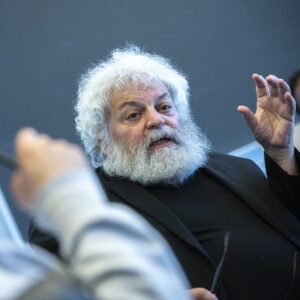
Shape the Future of Ethical Leadership: How Darden’s Institute for Business in Society is Paving the Way for Societal Impact — and Why Your Support Matters Now
By David Buie-Moltz
If you ask alumni what makes the University of Virginia Darden School of Business unique, you’ll likely hear about its rigorous curriculum, the transformational power of the Socratic case method or its unparalleled emphasis on ethics. But underneath these hallmarks lies a quieter force — a driving engine that has been steadily shaping the School’s trajectory since 2011: the Institute for Business in Society (IBIS). It’s more than just an academic center; it’s the umbrella under which Darden does its most impactful work in ethics. It’s the crucible for the ideas that have come to define Darden and will continue to shape its future.
As you stroll through Darden’s Grounds, you might not immediately grasp IBIS’s impact. But consider this: some of the groundbreaking initiatives and principles that Darden is known for today — like a focus on environmental sustainability and societal impact or pioneering work in public-private partnerships — trace their roots back to IBIS. It has also been central to Darden’s leadership in ethics, helping to shape and define ethical business practices globally.
Beyond Stakeholder Theory
Professor Ed Freeman’s stakeholder theory is often the first thing people associate with IBIS, and rightly so. It has become a cornerstone of business ethics worldwide, fundamentally altering how businesses consider their responsibilities to society. As Joey Burton, executive director of IBIS, emphasizes, stakeholder theory seeded the creation of new, crossdisciplinary ideas and research that continue to flourish at Darden. “We see IBIS as a launchpad for the next generation of ideas,” Burton says. “We want to ensure that Darden is known for stakeholder ethics and for the creation of the next set of transformative concepts that will define the future of business.”
This ethos is what drives IBIS to invest in ideas before they’re fully formed — what Burton likens to a venture capital approach within an academic setting. “We lower the cost of having ideas,” he says. “By providing the resources, support and intellectual freedom, we enable our faculty to take risks and explore uncharted territory.”
Reflecting on his own journey, Freeman adds, “When I first began developing stakeholder theory, it wasn’t just the idea that mattered — it was the environment here at Darden that allowed it to grow. I had the support to refine my thoughts, the challenge from colleagues to sharpen them and the community that believed in their potential. That’s what IBIS represents to me: a place where groundbreaking ideas can be nurtured and brought to life.”
On Sustainability and Healthcare
Another example of IBIS’s influence is the Sustainability Initiative, which has shaped Darden’s approach to environmental responsibility and social impact. This initiative was carefully cultivated within IBIS, aligning with the School’s long-term goals and positioning Darden as a leader in sustainable business practices. It’s no coincidence that Darden’s 2030 sustainability goals were directly influenced by the groundwork laid through IBIS.
The Healthcare Initiative, meanwhile, is a testament to IBIS’s role in responding to industry needs. As healthcare becomes increasingly vital to global economies, Darden recognized the necessity of preparing its students to lead in this complex sector. IBIS Director Maggie Morse, who supports the initiative, reflects, “We didn’t have the faculty or the infrastructure when we started, but IBIS gave us the support to build that foundation. Now, we’re equipping our students with the knowledge and skills to make a real difference in healthcare.”
These initiatives illustrate how IBIS serves as a hub for ideas keeping Darden at the forefront of ethical business education. And they are just the beginning.
New Frontiers in Business

Professor Vidya Mani leads the P3 Impact Award, created by IBIS with Concordia and
the U.S. State Department’s Office of Global Partnerships to recognize outstanding
public-private partnerships.
Among the recent developments at IBIS is its work in areas that might seem unconventional for a business school — like the critical minerals supply chain. As the world increasingly relies on minerals such as lithium and graphite for technology, energy and manufacturing, the ethical and practical challenges of these supply chains have come to the fore. Professor Vidya Mani, whose research spans sustainable global value chains and the operations-finance interface, is exploring these challenges. Her work focuses on how businesses can responsibly navigate the complexities of sourcing critical minerals while aligning with global sustainability goals.
“Supply chains for critical minerals are more than just a business issue — they’re a global challenge,” says Mani. “The research and teaching I’m leading here is about creating frameworks that businesses can use to ensure they’re not only profitable but also ethical in their practices.”
Mani’s involvement with projects such as the P3 Impact Award Program and her advisory role to a working group on critical minerals supply chain for a project at UVA’s Miller Center further illustrates the interdisciplinary and practical impact of IBIS’s reach. By working closely with industry and policymakers, IBIS ensures that Darden is not only contributing to the academic discourse but also providing actionable insights that address real-world challenges.
The role of strategic decision-making in these areas is crucial, and this is where faculty members like Professor Yo-Jud Cheng come into play. Specializing in corporate governance and the decision-making processes of boards, Cheng’s research uncovers how top executives and board directors shape firm strategy, governance and performance. Cheng’s work sheds light on how boards and executives can leverage their positions to create lasting, positive social impacts. Her research delves into the dynamics within top management teams and boards, offering insights into how their decisions shape the future of businesses and society alike.
“Understanding how boards make decisions for the long run, and how they can exercise their power responsibly, is crucial to shaping the future of business,” says Cheng. “My research focuses on how corporate governance can evolve to meet the challenges of today’s complex business environment, ensuring that the decisions made at the top lead to sustainable and ethical outcomes.”
The Academic Ecosystem
IBIS also nurtures the academic ecosystem at Darden. The institute played a pivotal role in relaunching the Ph.D. program, which was designed to bring fresh, innovative thinkers into the Darden community. This investment in future faculty is not just about maintaining Darden’s reputation; it’s about ensuring the School continues to produce the groundbreaking research and thought leadership in stakeholder ethics and other related topics it’s known for.
“IBIS has always been about placing bets on the future,” says Burton. “It’s about creating an environment where the next generation of business scholars can flourish.”
This approach has led to the creation of new centers, the development of cutting-edge curricula and the recruitment of faculty members who are not only great teachers and researchers but also leaders in their fields. The focus isn’t just on replicating past successes but on fostering a community where new ideas about business ethics can thrive.
The Case for Endowment Support
Despite its significant contributions, IBIS was launched without the endowment typically necessary for such an academic center. Founding support from biotechnology pioneer Amgen, leading security company Northrop Grumman Corporation and global packaging company WestRock helped lay the groundwork, but sustaining this momentum requires more. “The time is now to take the next step,” says Professor Jared Harris, co-academic director of IBIS alongside Professor Freeman. “The ideas we’re nurturing are too important to let stall.”
Harris highlights the way IBIS brings a focus to what, he says, “has long been the beating heart of the Darden School: advancing our understanding of business’s broader role in society.” He adds, “A passion for that connection coursing through the lifeblood of the School is the reason I joined Darden over a decade and a half ago. Yet it’s now more crucial than ever to ensure Darden stays at the forefront of thought leadership regarding business’s broader impact.”

Susan Sobbott (MBA ’90), Darden School Foundation trustee
and former president of Global Commercial Services at American
Express, is a strong supporter of IBIS.
Susan Sobbott (MBA ’90), a Darden School Foundation Board of Trustees member, echoes this sentiment. She’s currently teaching an executive education course on governance alongside Harris and sees IBIS as key to shaping leaders who understand that business is not just about profit but about driving meaningful change. “In an era of distrust in institutions, business leaders have a unique opportunity to rebuild confidence by being a positive force,” she says. “IBIS is essential to developing the kind of responsible leadership the world needs today.”
With IBIS’s track record of success, the need for financial support is more urgent than ever. Endowing IBIS isn’t just about securing its future; it’s about securing Darden’s future. It’s about ensuring Darden remains a place where ethical business ideas can flourish — where faculty have the freedom to innovate, and students have the opportunity to learn from the best.
For Darden alumni, this is a moment of opportunity. The ideas that have defined Darden’s success so far are just the beginning. If you want to see Darden continue to lead in business ethics, if you want to be part of shaping where the School goes next, then investing in IBIS is the way forward.
Be Part of Darden’s Next Chapter
To learn more about endowing IBIS, contact Samantha Hartog, senior associate vice president for advancement, at +1-434-981-4025 or HartogS@darden.virginia.edu.
The University of Virginia Darden School of Business prepares responsible global leaders through unparalleled transformational learning experiences. Darden’s graduate degree programs (MBA, MSBA and Ph.D.) and Executive Education & Lifelong Learning programs offered by the Darden School Foundation set the stage for a lifetime of career advancement and impact. Darden’s top-ranked faculty, renowned for teaching excellence, inspires and shapes modern business leadership worldwide through research, thought leadership and business publishing. Darden has Grounds in Charlottesville, Virginia, and the Washington, D.C., area and a global community that includes 18,000 alumni in 90 countries. Darden was established in 1955 at the University of Virginia, a top public university founded by Thomas Jefferson in 1819 in Charlottesville, Virginia.
Press Contact
Molly Mitchell
Senior Associate Director, Editorial and Media Relations
Darden School of Business
University of Virginia
MitchellM@darden.virginia.edu






